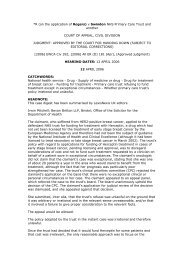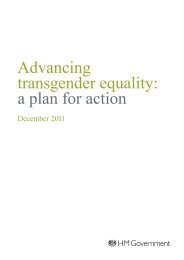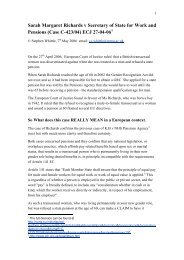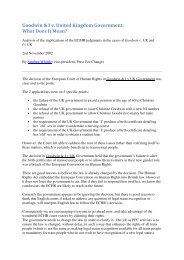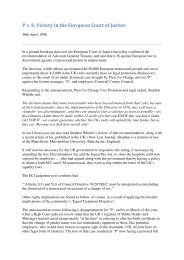Transgender EuroStudy â Legal Survey and Focus ... - ILGA Europe
Transgender EuroStudy â Legal Survey and Focus ... - ILGA Europe
Transgender EuroStudy â Legal Survey and Focus ... - ILGA Europe
Create successful ePaper yourself
Turn your PDF publications into a flip-book with our unique Google optimized e-Paper software.
51 April 2008<br />
There is very little published research concerning the issues facing trans people<br />
when accessing healthcare in the EU but from the available research it is clear<br />
that the issues facing trans people in accessing good quality healthcare are<br />
markedly similar from country to country. The second problem in terms of the<br />
paucity of research is that much of the research conducted subsumes trans<br />
people under the umbrella of ‘LGBT’ or ‘GLBT’ (for example The Medical<br />
Foundation 1997; Clark et al 2001), where data on trans issues is regrettably<br />
acknowledged as not available (Bell 2002; Quinn 2006). Some of the barriers for<br />
trans people accessing healthcare discussed below are similar to the LGBT<br />
community – for example lack of awareness by healthcare providers of the needs<br />
of these communities. There are, however, issues which are trans–specific which<br />
may not be addressed while under the ‘LGBT/GLBT’ umbrella – LGB people, for<br />
example, do not require a diagnosis from a medical professional in order to<br />
realise their identities. Moreover, the disadvantage of trans being incorporated<br />
under this ‘umbrella’ is that it may paradoxically maintain the erroneous view<br />
held by some practitioners that trans is an extreme form of homosexuality (as<br />
evidenced by Solymar 2006).<br />
The available research on the issues for trans people accessing healthcare focusses on the<br />
barriers experienced by trans people. These are access to health insurance; the type <strong>and</strong> quality of<br />
provision of trans-related healthcare in one country; the knowledge <strong>and</strong> the skills of practitioners on<br />
trans-specific clinical healthcare needs; as well as awareness <strong>and</strong> underst<strong>and</strong>ing of trans issues in<br />
general.<br />
It is documented that the treatment of gender dysphoria through gender reassignment has a<br />
very successful outcome in terms of quality of life. It is generally agreed by professionals working in<br />
the field that gender dysphoria cannot be alleviated by psychiatric treatment – for example drugs or<br />
therapy. The most comprehensive review of gender reassignment spanning over 30 years, 13 countries<br />
<strong>and</strong> over 2000 patients concluded that gender reassignment treatment was generally effective in<br />
relieving gender dysphoria, <strong>and</strong> that its positive results greatly outweighed any negative<br />
consequences gender reassignment yielded for patients with gender dysphoria (Pflafflin <strong>and</strong> Junge<br />
1998). Pfafflin <strong>and</strong> Junge looked at the specific beneficial effects of gender reassignment in four areas:<br />
subjective satisfaction, mental stability, socio-economic functioning, <strong>and</strong> partnership <strong>and</strong> sexual<br />
experience. The most important area they identified was subjective satisfaction, which they noted was<br />
a demonstrated outcome in all the studies they reviewed.<br />
Studies on the quality of life of trans people undergoing treatment have also found that early<br />
diagnosis <strong>and</strong> intervention do reduce the symptoms <strong>and</strong> increase quality of life (Nakane <strong>and</strong> Ozawa<br />
2005) in particular the first stage – hormone treatment (Newfield et al 2006). Yet, the research on trans<br />
issues <strong>and</strong> access to healthcare suggests that much healthcare provision fails in the treatment of trans




